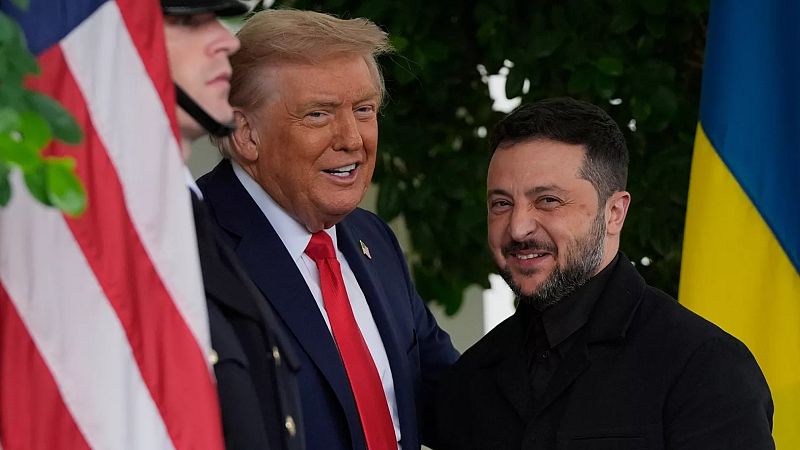US intelligence sharing to help Ukraine knock out even more Russia’s refining capacity

The US is set to provide Ukraine with intelligence to support long-range strikes on energy infrastructure targets deep inside Russia, according to US outlets.
The decision marks a crucial step and signals a significant shift in Washington's stance on supporting Ukraine, as it proves a strengthening US commitment to assist the country, despite Moscow's continued rejection of direct negotiations with Kyiv.
US officials reportedly said the intelligence will allow Ukraine to target “refineries, pipelines, power stations and other infrastructure far from its borders," with Washington urging NATO allies to follow suit and expand similar cooperation.
The intelligence shared by the US, including satellite imagery and other monitoring data, could be of significant help in improving the accuracy of Ukraine’s strikes deep inside Russia.
The US administration led by President Donald Trump is also weighing the delivery of Tomahawk missiles to Ukraine, which could hit targets up to 800 kilometres away.
Speaking at the European Political Community summit in Copenhagen on Thursday, Ukrainian President Volodymyr Zelenskyy confirmed he discussed the possibility with his US counterpart.
"We spoke with the United States. We are very thankful to President Trump for this dialogue. Last time we had a very good meeting, a very productive dialogue. And we spoke about long-range weapons," Zelenskyy said.
“We used only our weapons until now. After my meeting with Trump, we will maybe have something more. We will see.”
“We do our best to have the US on our side”, he said.
Tomahawk missiles have been on Kyiv’s wish list for a while. With an operational range between 1,600 and 2,500 kilometres and a powerful warhead of around 400-450 kilograms, they could reinforce Ukraine’s strikes deep into Russia.
For the moment, Ukraine relies on Western-supplied missiles, such as Storm Shadow, which are limited in range by approximately 250 kilometres.
For anything further than this, Kyiv is utilising its domestically produced drones and drone-like missiles, such as the Palianytsia, but their warhead payload is limited to 50-100 kilograms.
This is why Kyiv believes US intelligence sharing could reinforce Ukraine’s deep strike strategy, while the Tomahawk missiles could fully transform it.
Kyiv knocked out nearly 40% of Russia's refining capacity
Over the past several months, Ukraine has significantly intensified the strikes against Russia's energy sites, but Kyiv insists it is “not attacking civilian infrastructure, like Russia has been doing in Ukraine” and is “only answering the attacks on our (Ukraine’s) energy.
What Kyiv needs, Zelenskyy said, is to "be comparable".
“When they (Russia) use each day 500 drones, we use 100-150. We need to finance our capability,” the Ukrainian leader stated, adding that compared to how Kyiv responded a year ago when Moscow was attacking its civilian energy infrastructure, the situation is now different and Russia now “feels our strong answer”.
Zelenskyy further explained that Russian leaders will have to answer "more questions from their society", referring to the deepening fuel shortages.
According to Kremlin-affiliated media, around 40% of Russia’s oil refining capacity for petrol and diesel fuel has been halted due to Ukrainian drone attacks as of the end of September.
Ukrainian strikes have targeted at least 16 of Russia's 38 oil refineries since August 2025, causing a domestic fuel shortage across Russia, according to FT reports.
In some regions, petrol is limited to 10-20 litres per customer.
With the situation worsening over the past weeks, Russia is reportedly preparing to import petrol from China, South Korea and Singapore to offset a growing domestic fuel shortage.
For this, Moscow plans to lift import duties on fuel entering through select checkpoints in the Far East and is ready to subsidise importers by covering the gap between global market prices and lower domestic petrol prices, utilising funds from the federal budget.
Kremlin-affiliated outlets have reported that Deputy Prime Minister Alexander Novak sent a letter to Russia’s Prime Minister Mikhail Mishustin, warning that the risk of further deterioration in Russia’s domestic petrol supply remains, despite the government’s planned interventions.
Russian oil companies are unable to fix the damage and address the situation, according to reports. Any repairs at the affected refineries could take months, as Western sanctions have blocked the supply of necessary equipment.
Today

